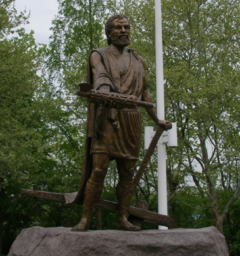
Back لوشيوس كوينكتيوس سنسيناتوس Arabic لوشيوس كوينكتيوس سنسيناتوس ARZ Луцый Квінкцый Цынцынат Byelorussian Луций Квинкций Цинцинат Bulgarian Lucius Quinctius Cincinnatus Breton Luci Quinti Cincinnat (cònsol 460 aC) Catalan Cincinnatus Czech Lucius Quinctius Cincinnatus Danish Lucius Quinctius Cincinnatus German Κιγκινάτος Greek
Lucius Quinctius Cincinnatus | |
|---|---|
 | |
| Born | c. 519 BC |
| Died | c. 430 BC (aged c. 89) |
| Nationality | Roman |
| Office | |
| Spouse | Racilia |
| Children | |
| Family | Quinctia gens |
| Military service | |
| Battles/wars | Battle of Mount Algidus (458 BC) |
Lucius Quinctius Cincinnatus (c. 519 – c. 430 BC) was a Roman patrician, statesman, and military leader of the early Roman Republic who became a legendary figure of Roman virtue—particularly civic virtue—by the time of the late Republic.
Cincinnatus was an opponent of the rights of the plebeians (the common citizens) who fell into poverty because of his son Caeso Quinctius's violent opposition to their desire for a written code of equally enforced laws. Despite his relatively old age, he worked his own small farm until an invasion prompted his fellow citizens to call for his leadership. He came from his plough to assume complete control over the state but, upon achieving a swift victory in only sixteen days,[1] relinquished his power and its perquisites and returned to his farm. His success and immediate resignation of his near-absolute authority with the end of this crisis (traditionally dated to 458 BC) has often been cited as an example of outstanding leadership, service to the greater good, civic virtue, humility and modesty.
Modern historians question some particulars of the story recounted in Livy and elsewhere but usually accept Cincinnatus as a historical figure who served as suffect consul in 460 BC and as dictator in 458 BC and (possibly) again in 439 BC, when the patricians called on him to suppress the feared uprising of the plebeians under Spurius Maelius, after which he is said to have once again ceded power.
- ^ Hillyard, Michael J. (2001). Cincinnatus and the Citizen-Servant Ideal: The Roman Legend's Life, Times, and Legacy. Xlibris Corporation. ISBN 978-1-4628-0465-8.
© MMXXIII Rich X Search. We shall prevail. All rights reserved. Rich X Search